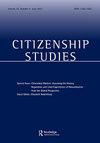Nationalism and populist politics: the migrant-citizen conundrum in Assam
IF 1.9
3区 社会学
Q3 POLITICAL SCIENCE
引用次数: 1
Abstract
ABSTRACT The article explores the far-reaching repercussions of British colonialism in producing hierarchical identities around religion, identity, and ethnicity in the northeastern state of Assam in India. The trajectory of people’s mobility across the border, due to political and economic reasons, has led to contention around legality, demography, and electoral outcomes. The article elucidates how nationalism, populism and the politics of insecurity have been played out whereby perceived collective threats are framed and acted upon. Traversing from past to present and apprehending the lurking dystopia, the article explains how the populist politics of othering residents in the borderland state of Assam has initiated various statist initiatives to differentiate natives from migrants, and citizens from residents. It grapples with the shifting meaning of a ‘native’ that qualifies or disqualifies populations from their citizenship, and examines how populist governance uses a migrant figure to seek legitimacy of its exclusionary citizenship policies and practices. It explores the dialogic functioning of a Hindu nationalist governance at the centre and an ethno-nationalist governance in Assam in a right-wing populist milieu. In the context in which migration is framed as a threat to the people, the article engages with the politics of insecurity, anxiety, and grievance.民族主义与民粹主义政治:阿萨姆邦的移民公民难题
摘要本文探讨了英国殖民主义在印度东北部阿萨姆邦围绕宗教、身份和种族产生等级认同的深远影响。由于政治和经济原因,人们跨境流动的轨迹引发了围绕合法性、人口统计和选举结果的争论。这篇文章阐述了民族主义、民粹主义和不安全政治是如何发挥作用的,由此形成了感知到的集体威胁并采取了行动。文章从过去穿越到现在,抓住了潜在的反乌托邦,解释了边境阿萨姆邦其他居民的民粹主义政治是如何发起各种国家主义倡议,将土著人与移民、公民与居民区分开来的。它努力解决“本地人”的含义的变化,即使人们有资格或不资格获得公民身份,并研究民粹主义治理如何利用移民人物来寻求其排斥性公民政策和做法的合法性。它探讨了处于中心的印度教民族主义治理和阿萨姆邦在右翼民粹主义环境中的民族主义治理的对话功能。在移民被视为对人民的威胁的背景下,这篇文章涉及不安全、焦虑和不满的政治。
本文章由计算机程序翻译,如有差异,请以英文原文为准。
求助全文
约1分钟内获得全文
求助全文
来源期刊

Citizenship Studies
POLITICAL SCIENCE-
CiteScore
3.60
自引率
11.10%
发文量
85
期刊介绍:
Citizenship Studies publishes internationally recognised scholarly work on contemporary issues in citizenship, human rights and democratic processes from an interdisciplinary perspective covering the fields of politics, sociology, history and cultural studies. It seeks to lead an international debate on the academic analysis of citizenship, and also aims to cross the division between internal and academic and external public debate. The journal focuses on debates that move beyond conventional notions of citizenship, and treats citizenship as a strategic concept that is central in the analysis of identity, participation, empowerment, human rights and the public interest.
 求助内容:
求助内容: 应助结果提醒方式:
应助结果提醒方式:


